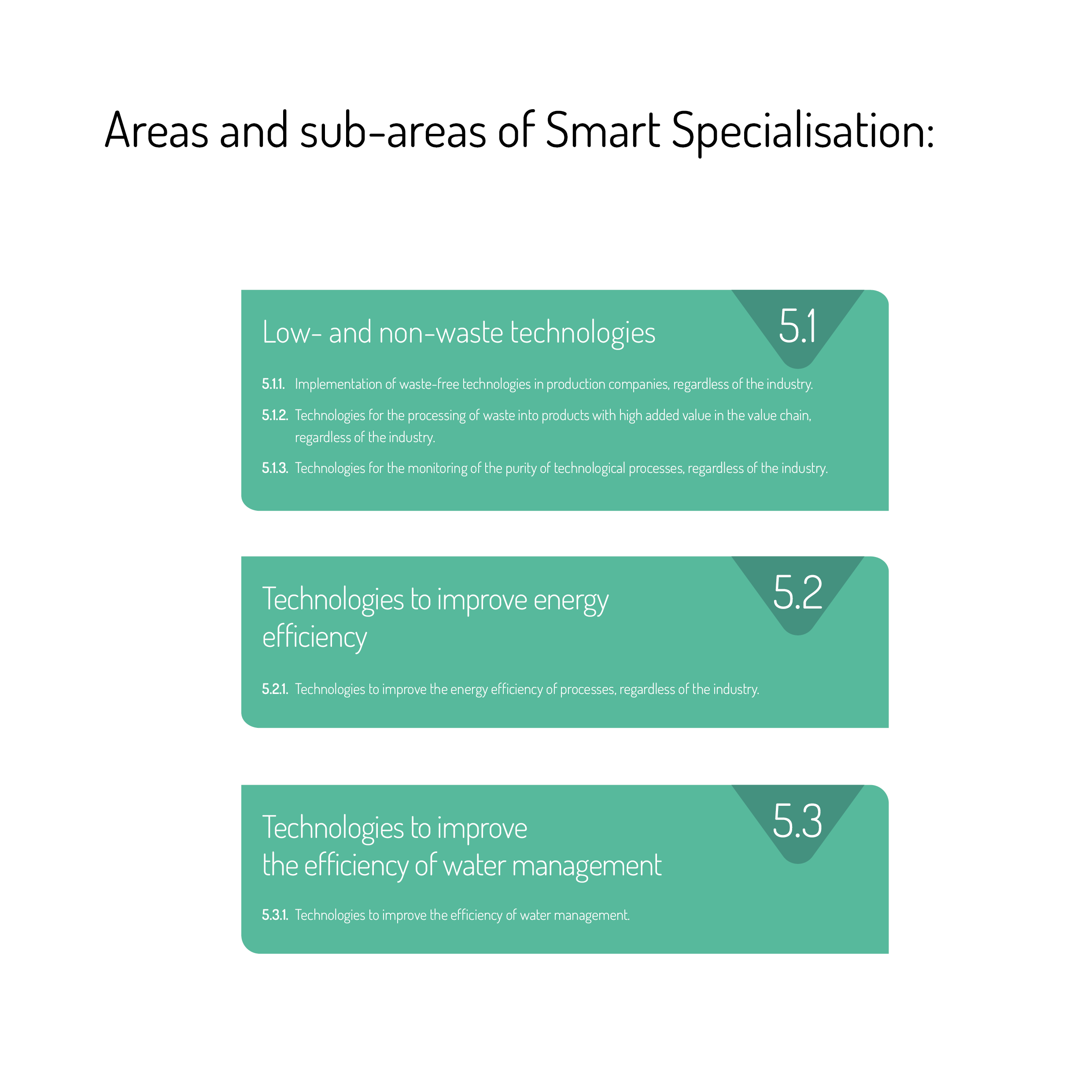
‘Green Deal’ - a horizontal specialisation encompassing low- and zero-waste technologies (i.e. effective management of waste generated in a production company – ‘zero waste’ through waste prevention, preparation for reuse, recycling or other recovery), ‘circular’ technologies (in particular by managing the waste generated in other companies in the value chain) - regardless of industry and sector. Specialisation also includes:
- Energy efficiency technologies (reduction and rationalisation of purchased energy and energy recovery from business processes);
- Technologies for rational water management (inter alia recovery and use of rainwater, geothermal water, sea water and brackish water, reduction of losses in water distribution systems; small-scale retention and use of rainwater in urban and rural areas);
- Procurement of energy from renewable sources (for own consumption).
The climate changes we are witnessing have a strong impact on all spheres of life. It is therefore not surprising that efforts to counteract their negative effects and (as far as possible) to reduce the factors considered responsible have gained particular importance in the last few years. The recognition of the above-mentioned areas as the Lower Silesian Smart Specialisation ‘Green Deal’ results from the priority character of actions aimed at minimising the effects of climate change (which is confirmed in strategic documents and actions at all levels, from local through national and EU to global).
The following areas and sub-areas of specialisation have been identified:

5.1.1.
Specialisation encompasses the implementation of waste-free technologies according to the zero waste philosophy, regardless of the industries and sector in which they are applied. This means that the waste generated in a production company is managed in accordance with the waste hierarchy (waste prevention, preparation for re-use, recycling or other recovery).
5.1.2.
Specialisation encompasses the implementation of waste-free technologies in accordance with the philosophy of the 'circular economy' regardless of the industries and sector in which they are applied. This means that waste generated in a production company is managed in other companies in the value chain according to the waste hierarchy (waste prevention, preparation for reuse, recycling or other recovery). Specialisation encompasses value chains that may consist of producers, users, waste collectors and waste segregators, and waste processors and the technologies they use.
5.1.3.
Specialisation encompasses the deployment of sensor networks enabling remote, non-contact emission measurement (e.g. optical, laser sensors) and technologies for the precise monitoring of trace emissions, including technologies enabling in situ (in-process) multicomponent monitoring, e.g. monitoring of carbon dioxide, formaldehyde, nitrogen oxide, greenhouse gases, etc.
5.2.1.
Specialisation encompasses the implementation of technologies that reduce and rationalise the consumption of purchased energy and the recovery of energy from enterprise processes, as well as the generation of energy from renewable sources for the company's own use, regardless of the industry.
5.3.1.
Specialisation encompasses the implementation of: technologies for the recovery and utilisation of rainwater, geothermal water, sea water and brackish water, leading to the production of water for consumption and economic purposes; system solutions for the closure and integration of water circuits and the return of technological water in municipal and industrial systems within the framework of industrial symbiosis; technologies for reducing losses in water distribution systems; IT monitoring systems aimed at increasing the efficiency of water resources utilisation; monitoring and metering technologies for increasing the efficiency of water resources utilisation, i.e., reducing water consumption and losses in water supply systems with the use of information and communication technologies and spatial information systems; technologies for small-scale retention and use of rainwater in urban and rural areas, as well as in technological circuits and for domestic purposes; smart rainwater collection and disposal systems exploiting the potential of natural, quasi-natural and/or channel (infrastructure) retention; engineering, spatial and organisational solutions for the retention, treatment and management of rainwater in urban and semi-urbanised areas as an alternative to 'collect and drain' solutions.
